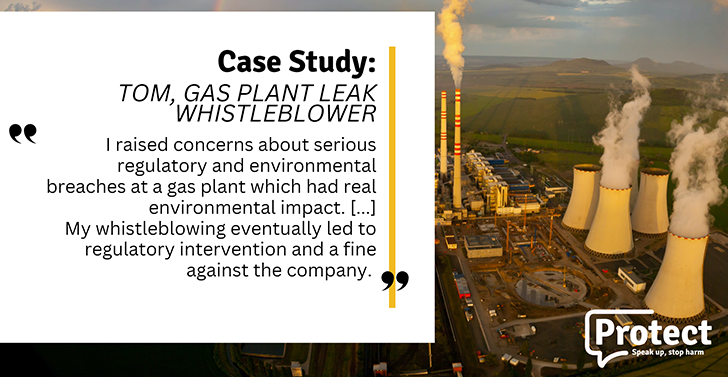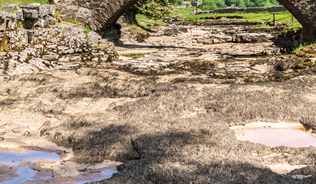Fly tipping, oil spills, illegal burning of waste, agricultural runoffs, methane gas leaks, bribery and fraud: whistleblowers have a key role to play in preventing environmental damage. The Government certainly seemed cognisant of this when it introduced whistleblowing legislation 25 years ago, which gave workers the right not to be treated negatively for raising concerns about environmental damage. Yet research carried out by Protect, the UK’s whistleblowing charity, shows that only a third of workers are aware of their right to raise environmental concerns.
Worryingly, it also appears that workers who do raise environmental concerns are often ignored and victimised. A third of workers who reported raising an environmental issue at work in the last two years said their concerns weren’t followed up, while almost three-quarters of the environmental whistleblowers who contacted Protect over the last 10 years said they faced negative treatment after speaking up.
Information is power: you can’t exercise your rights if you don't know about them. It's vital that workers are both aware of their right to raise environmental concerns, and that they have practical knowledge of whistleblowing to ensure they know how to raise concerns safely and effectively. This is why the charity Protect has created the Environmental Whistleblowing Toolkit.
What is the Environmental Whistleblowing Toolkit?
The Toolkit is a free, practical and legal guide to raising workplace environmental concerns. Drafted with assistance from trade unions, lawyers, non-governmental organisations (NGOs) and journalists, it provides information on whistleblowing in the workplace in a clear and accessible way. The Toolkit covers the key topics that workers may need to think about when raising or escalating an environmental concern, and addresses the issues that might arise throughout the whistleblowing journey.
From first identifying an environmental concern and considering where and how to raise it in order to maximise the chance that it gets addressed, to thinking about practical steps to minimise the risk of victimisation, the Toolkit is a useful companion for those who want to understand their rights and best practice when it comes to environmental whistleblowing.
Who are environmental whistleblowers?
Environmental whistleblowers are people in the workplace who raise concerns about wrongdoing, risk or malpractice that poses a threat to the environment. This can be in any sector, industry or function. An environmental whistleblower could be a lab worker concerned about the disposal of chemicals, a finance worker disclosing concerns about misrepresentation of a fund's ESG credentials, a seafarer highlighting water pollution, or a communications officer challenging greenwashing.
Protect has spoken to courageous environmental whistleblowers across a range of sectors, including advertising, energy, agriculture and local government. Their personal stories serve as a strong reminder of the vital role whistleblowers play in preventing harm to the environment.
The Toolkit includes some of their stories, such as that of Tom: a manager of a gas plant who was fired after raising concerns about serious regulatory breaches, including defects in the structure of the plant, which were causing damage to the environment and risks to health and safety. Whilst Tom's whistleblowing came at a personal cost, his perseverance led to regulatory intervention and a fine against the company.

What rights do environmental whistleblowers have?
UK whistleblowing rights are employment rights, meaning the law only applies to workers and employees. Other individuals, such as volunteers and trustees, may wish to raise whistleblowing concerns regardless, but they are currently not protected under whistleblowing legislation.
It is unlawful for an employer to dismiss an employee, or victimise a worker or employee, for raising whistleblowing concerns. If a worker is subjected to such treatment, they may be able to bring a claim in the Employment Tribunal for financial compensation and/or reinstatement, or re-engagement (in the case of employees). However, only certain types of concerns, raised in the correct way, are protected. The worker must provide information that, in their reasonable belief, tends to show one of six categories of wrongdoing and is also in the public interest. They must also raise their concern to the correct person or organisation.
Environmental concerns are broad, and encompass different types of wrongdoing and harm. Whilst the 'environmental damage' category may capture a multitude of issues, several other categories are also likely to be relevant. For example, many concerns will be a 'breach of a legal obligation', but only some will be a 'criminal offence'. More information about what is protected, and how to raise concerns in line with the law, can be found in the Toolkit.
In certain circumstances, other legal mechanisms may be available to workers who raise environmental concerns. For example, if a worker's climate-related beliefs constitute a philosophical belief, they may be able to bring a claim under the Equality Act 2010. Alternatively, if whistleblowing law does not apply and the worker has experienced harm as a result of the way their employer handled their concerns, they may be able to bring a negligence claim in the High Court.
Both these methods are relatively new and untested, so it's important to seek legal advice before attempting to use them. More information about these claims can be found in the Toolkit in Section 7.2, 'Equality Act 2010 Claims' and Section 7.3, 'Other claims'. These sections are drafted by lawyers with expertise in those specialist areas.
What should workers consider when raising a concern?
Whistleblowing can be risky, and concerns are not always listened to. As such, it is important to consider a number of practical and strategic points before raising an environmental concern. One of the key considerations is where to raise the concern. Generally, it is best for workers to go direct to their employer, but this isn't always possible.
Whistleblowing law provides protection to workers raising concerns both internally to their employer, and to other organisations such as a regulator, an MP/MSP, or even the press. However, there are higher legal standards that must be met in order to access protection when raising concerns externally.
The regulatory landscape surrounding environmental concerns is particularly complex, and this can make it difficult to identify the correct regulator for a concern. Environmental legislation is still developing, and many regulators whose primary focus is not the environment are taking a keen interest in the matter.
For example, The Competition and Markets Authority has honed in on greenwashing, and has released a Green Claims Code, whilst the Financial Conduct Authority is currently updating its Sustainability Disclosure Requirements. Protect's Toolkit includes a table that sets out the scope and contact details for many of the regulators who have oversight of environmental matters.
Workers should also assess their own personal risk of victimisation and consider steps they can take. This should include deciding whether to raise the concern anonymously, confidentially, or openly. It is also prudent to bear in mind the manner and tone in which concerns are raised. The Toolkit provides a list of practical tips and strategies for minimising risk.
Where next?
Workers are the eyes and ears of an organisation, and are best placed to spot when things go wrong. With the right information, they can raise concerns and damage can be prevented, minimising the impact on the environment. By exposing environmental wrongdoing, they can also help to ensure that organisations are held accountable for their climate impacts, and that there is appropriate intervention where required. Protect hopes the Toolkit will empower and encourage workers to understand their rights and to speak up, safely and effectively.
If you're interested in finding out more about environmental whistleblowing and the law, read Protect Legal Director Sybille Raphael's article on the Aarhus Convention in the Environmental Justice issue of the environmental SCIENTIST.

Caitlín Comins is a Legal Officer at Protect. She has in-depth knowledge of whistleblowing law, having advised hundreds of whistleblowers. She spearheaded the charity’s environmental whistleblowing project and the creation of its Environmental Whistleblowing Toolkit. She also has expertise in assisting organisations to improve their whistleblowing arrangements.
Note: This blog contains general information about law and legal practice. The information is not advice, and should not be treated as such. The legal information on this website is provided without any representations or warranties, express or implied. We make no representations or warranties in relation to the legal information on this website. You must not rely on the information on this website as an alternative to legal advice from your lawyer or other professional legal services provider. If you have any specific questions about any legal matter you should consult your lawyer or other professional legal services provider.





